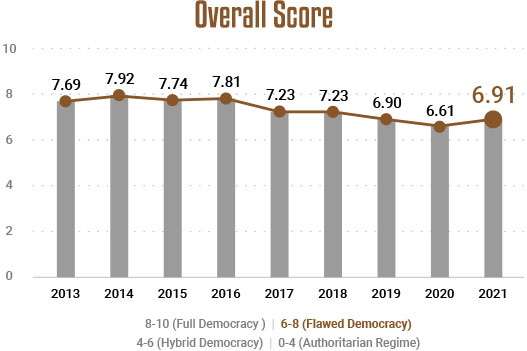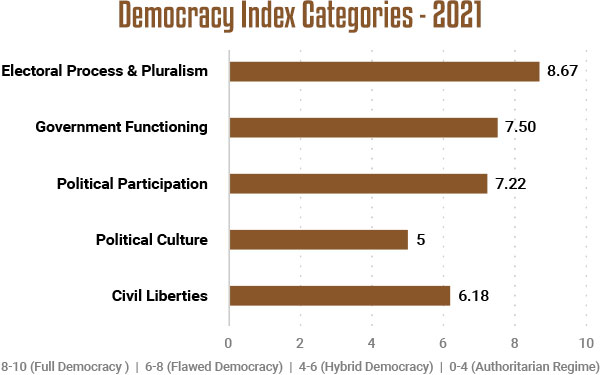
The Economist Intelligence Unit (EIU) released its 2021 edition of the Democracy Index last month. The government’s failure to crack down on the persecution of religious and other minorities by Hindu nationalists continues to weigh on India’s democracy score, which has declined significantly in recent years.

India's performance level is at 69% on the Democracy Index in 2021, compared to a performance level of 66% in 2020. India is currently classified as a "Flawed Democracy" based on its performance on the Index in 2021, a status it has held since 2010. India's rank improved by 7 places and it is placed at the 46th position amongst 167 countries on the Index in 2021.
As quoted in the Democracy Index report of 2021, "Caution is merited for India, whose score improved by 0.30: this follows a cumulative 1.20 decline between 2016 and 2020, reflecting a serious deterioration in the quality of democracy under leader Narendra Modi, whose Hindu-nationalist Bharatiya Janata Party (BJP) has presided over increased intolerance and sectarianism towards Muslims and other religious minorities."
| Also read: Detailed statistical insights on the Democracy Index |

The Democracy Index is based on 60 indicators grouped in five different categories.
- Electoral Process and Pluralism: After holding steady at a near-perfect performance level of 95.8% between 2010 to 2016, India's score on electoral process and pluralism has been steadily declining since 2017 to reach a performance level of 86.7% in 2021. India's performance level of 86.7% in 2021 is also higher than the world average of 56.2%.
- Government Functioning: India's efforts in government functioning have seen its performance level rise marginally from 67.9% in 2019 to 75% in 2021 bringing it to the same level as that in 2016. In 2021, India's performance level is also higher than the world average of 46%.
- Political Participation: India's performance level on political participation improved to 72.2% in 2021 from 66.7% a year ago. India's performance level of 72.2% in 2021 is also higher than the world average of 53.9%.
- Political Culture: India's performance remained steady at a level of 50% in 2021, thus achieving a classification of "hybrid democracy" on the political culture performance factor.
- India's performance level of 50% in 2021 is also lower than the world average of 53.8%.
- Civil Liberties: India's performance on civil liberties is at the level of 61.8% in 2021 - higher than the world average of 53.7%.

While India's performance has been consistently higher than the world average, it has been on a steady decline falling from a level of 72% in 2010 to 69% in 2021. Norway has maintained its hold on the top spot on the Democracy Index in 2021 with an overall performance level of 98%.
Joan Hoey, Editor of EIU's 2021 Democracy Index report, mentioned, "With the Western democratic capitalist model facing an increasing challenge from China (classified as an 'authoritarian regime'), the real challenge for the West may not be to figure out how to prevent China from one day becoming the dominant global power, but to manage that process in such a way as to avoid war and preserve democracy and the best of the Western enlightenment legacy."
Reference Reading
What is the Democracy Index?
The Democracy Index is an index compiled by the Economist Intelligence Unit (EIU), the research and analysis division of The Economist Group. The index measures the state of democracy in 167 countries, of which 166 are sovereign states and 164 are UN member states. The index was first published in 2006 and is based on 60 indicators grouped in five different categories, measuring pluralism, civil liberties and political culture. In addition to a numeric score and a ranking, the index categorizes each country in one of four regime types:
- Full Democracies - Nations where civil liberties and fundamental political freedoms are not only respected but also reinforced by a political culture conducive to the thriving of democratic principles. These nations have a valid system of governmental checks and balances, an independent judiciary whose decisions are enforced, governments that function adequately, and diverse and independent media. These nations have only limited problems in democratic functioning.
- Flawed Democracies - Nations where elections are fair and free and basic civil liberties are honored but may have issues (e.g. media freedom infringement and minor suppression of political opposition and critics). These nations have significant faults in other democratic aspects, including underdeveloped political culture, low levels of participation in politics, and issues in the functioning of governance.
- Hybrid Regimes - Nations with regular electoral frauds, preventing them from being fair and free democracy. These nations commonly have governments that apply pressure on political opposition, non-independent judiciaries, widespread corruption, harassment and pressure placed on the media, anaemic rule of law, and more pronounced faults than flawed democracies in the realms of underdeveloped political culture, low levels of participation in politics, and issues in the functioning of governance.
- Authoritarian Regimes - Nations where political pluralism has vanished or is extremely limited. These nations are often absolute monarchies or dictatorships, may have some conventional institutions of democracy but with meagre significance, infringements and abuses of civil liberties are commonplace, elections (if they take place) are not fair and free, the media is often state-owned or controlled by groups associated with the ruling regime, the judiciary is not independent, and there are omnipresent censorship and suppression of governmental criticism.
The report is widely cited in the international press as well as in peer reviewed academic journals.
TO READ THE FULL ARTICLE

Get full access to the exciting content on The Mirrority by logging in
Support independent journalism
Even the very best of media houses in our country today are yielding to the pressure of click-bait journalism in order to survive. More than ever before, our country needs journalism that is independent, fair and non-pliant to the bureaucracy. Such journalism needs the support of like-minded readers like you to help us survive editorially and financially.
Whether you live in India or India lives inside you, help us continue to produce quality journalism with your contribution.
CONTRIBUTE
